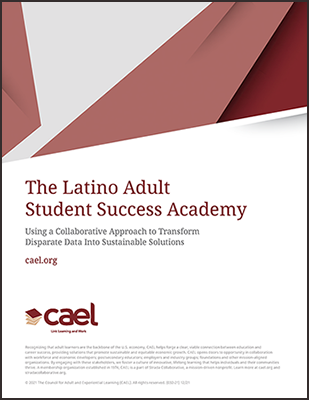Share this
CAEL Highlights LASS Academy in New Report
by Carlo Bertolini on Dec 10, 2021
In 2018, 15 postsecondary institutions joined in the three-year Latino Adult Student Success (LASS) Academy to develop and implement targeted strategies that support Latino adult students (and adult learners generally) in their pursuit of postsecondary credentials. The LASS Academy was the inaugural cohort under the Council for Adult and Experiential Learning (CAEL)s Adult Learner Academy model, an approach that combines data analysis, technical assistance, and peer-to-peer learning to support new action plans and strategies for improving services and programs for important target populations. The data used in the initiative included enrollment, course completion, persistence, and graduation metrics along with surveys of the institutions staff and current adult students through CAELs Adult Learner 360 process.
Through the LASS Academy, institutions learned more about the academic prospects of their current Latino adult and adult learner populations, collected and reviewed data on the needs of these students, and developed action plans to address them. Focusing on critical institutional goals such as improved enrollment, persistence, and completion, the institutions implemented strategies such as: targeted marketing and outreach, enhanced credit for prior learning (CPL) programs, improved onboarding of Latino adult students, intentional advising that addresses Latino adult student needs, and expansion of career services and post-graduation employment. While the LASS Academys time frame was too short to capture the longer-term impact of these strategies in terms of student persistence and completion, the project focused on creating a more data-driven culture within the institutions by establishing processes for collecting and disaggregating such data to inform programs and services in the long run. Positive trends in Adult Learner 360 diagnostics, average credits completed by adults and Latino adults, and other key student success metrics also emerged.
In addition, the experience offered several important lessons that underscored the advantages of the Academy model. The institutions benefited from the opportunity to connect with each other and share strategies, and they valued the emphasis on the use of both quantitative data from their own student records and the analysis of new qualitative survey results. The initiative further showed the creative resilience of the institutions to quickly change course during the pandemic and adjust their implementation plans in the course of its shifting circumstances.
Download the full report:
Share this
- Adult Learner Success (113)
- CAEL Members (81)
- Success Stories (80)
- Workforce Development (66)
- Credit for Prior Learning (60)
- Best Practices (52)
- Impact (44)
- Career Pathways Support (38)
- Strategic Partnerships (34)
- Work-based Learning (31)
- Upskilling and Reskilling (27)
- Trends in Higher Education (26)
- Curation (22)
- Inclusion (20)
- Q&A (20)
- Policy (18)
- Retention and Completion (18)
- Talent Management (18)
- Adult Learner 360 (16)
- Research (13)
- Short-term Credentials (13)
- Military-connected Learners (11)
- Student support (11)
- Competency Based Education (CBE) (10)
- Adult Learner Academy (9)
- Transfer Students (9)
- Enrollment (8)
- Student Stories (8)
- Education Benefits (7)
- Experiential Learning (7)
- Featured (6)
- HSIs (6)
- In the news (6)
- NACTEL (6)
- Online Learning (6)
- Case Studies (5)
- Community colleges (5)
- EPCE (5)
- Guest blog (5)
- Wraparound Support (5)
- Apprenticeships (4)
- COVID-19 (3)
- Future of work (3)
- HBCUs (3)
- Structural Approaches to Learning (3)
- Accelerated Program (2)
- Credit Predictor Pro (2)
- Student parents (2)
- Tuition (2)
- Comebackers (1)
- Skills-based hiring (1)
- Upcoming (1)
- April 2025 (2)
- March 2025 (8)
- February 2025 (8)
- January 2025 (5)
- December 2024 (5)
- November 2024 (4)
- October 2024 (8)
- September 2024 (7)
- August 2024 (10)
- July 2024 (9)
- June 2024 (8)
- May 2024 (11)
- April 2024 (5)
- March 2024 (7)
- February 2024 (5)
- January 2024 (7)
- December 2023 (10)
- November 2023 (7)
- October 2023 (3)
- September 2023 (4)
- August 2023 (3)
- July 2023 (5)
- June 2023 (8)
- May 2023 (9)
- April 2023 (5)
- March 2023 (6)
- February 2023 (5)
- January 2023 (3)
- December 2022 (4)
- November 2022 (7)
- October 2022 (7)
- September 2022 (6)
- August 2022 (6)
- July 2022 (4)
- June 2022 (6)
- May 2022 (4)
- April 2022 (4)
- March 2022 (3)
- February 2022 (5)
- January 2022 (5)
- December 2021 (4)
- November 2021 (2)
- October 2021 (8)
- September 2021 (4)
- August 2021 (4)
- July 2021 (2)
- June 2021 (6)
- May 2021 (5)
- April 2021 (9)
- March 2021 (8)
- February 2021 (5)
- January 2021 (4)
- December 2020 (4)
- November 2020 (3)
- October 2020 (6)
- September 2020 (2)
- August 2020 (1)
- July 2020 (4)
- May 2020 (2)
- April 2020 (1)
- March 2020 (2)
- February 2020 (2)
- January 2020 (3)
- December 2019 (2)
- July 2019 (1)
- May 2019 (1)
- February 2019 (1)
- January 2019 (1)
- October 2018 (4)
- September 2018 (1)
- August 2018 (1)
- July 2018 (1)
- May 2018 (1)
- April 2018 (2)
- March 2018 (1)
- February 2018 (2)
- September 2017 (1)
- August 2017 (2)
- July 2017 (5)
- June 2017 (4)
- May 2017 (3)
- March 2017 (1)
- February 2017 (4)
- December 2016 (3)
- November 2016 (1)
- October 2016 (3)
- August 2016 (8)
- July 2016 (2)
- June 2016 (2)
- May 2016 (5)
- April 2016 (2)
- March 2016 (6)
- February 2016 (9)
- January 2016 (4)
- January 2015 (2)

